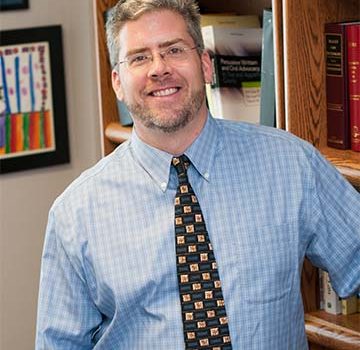Law Faculty News: Examining a new era of law, technology, and privacy
Law Faculty News
UMass Law Associate Dean Shaun Spencer informs emerging debates over the appropriate regulation of privacy, technology, and information policy
UMass Law Associate Dean for Academic Affairs Shaun Spencer has studied the intersection of law, technology, and privacy for two decades. His research examines how law fails to keep pace with technological and social change in domains such as consumer protection, intelligence collection, and criminal investigations. He has studied such technologies as location tracking by law enforcement, the bulk collection of telephone metadata by the National Security Agency, the use online behavioral advertising to influence consumers and voters, and content moderation by social media platforms.
Spencer’s recent articles study how to regulate companies’ attempts to use our data to manipulate the choices we make and the speech that we share. In The Problem of Online Manipulation, he details the history of manipulative marketing practices and the increasingly personalized approaches made possible as manipulation moves online. He also identifies the definitional and constitutional challenges presented by attempts to regulate online manipulation and suggests that the core objection to online manipulation is not its manipulative nature but its intrusive online implementation. For those reasons, he opposes direct regulation and argues instead that the threat of data-driven manipulation supports the current push for comprehensive data protection legislation.
In Two First Amendment Futures: Consumer Privacy Law and the Deregulatory First Amendment, Spencer explains how proposed consumer privacy laws implicate a long-running contest over the scope and meaning of the First Amendment’s speech clause. The debate about whether to pass a comprehensive federal privacy law has largely ignored the inevitable First Amendment challenges. As Spencer explains, these challenges will occur in the context of the “deregulatory First Amendment,” the Supreme Court’s decades-long expansion of the First Amendment’s constraint on economic regulation.
Finally, in The First Amendment and the Regulation of Speech Intermediaries, Spencer addresses the debate on overregulating social media platforms. Applying long-settled First Amendment doctrine to platform regulation presents significant analytical challenges. Spencer aims to mitigate at least some of those challenges by isolating the under-examined role of the speech intermediary in First Amendment jurisprudence. Speech intermediaries introduce new speech interests that may conflict with the traditional speaker and listener interests that First Amendment doctrine evolved to protect. Spencer proposes a taxonomy of speech intermediary functions—conduit, curator, commentator, and collaborator—to help courts understand how the speaker, listener, and intermediary interests at issue should affect whether a particular regulation survives First Amendment scrutiny.
Spencer’s research informs emerging debates over the appropriate regulation of privacy, technology, and information policy. His work on online manipulation and the deregulatory First Amendment bears directly on the Congressional debate over proposed consumer privacy regulation. Further, his work on the regulation of speech intermediaries examines recent challenges to Florida and Texas laws attempting to limit social media platforms’ content moderation practices. Two federal appeals courts have taken conflicting positions on the issue that Spencer discusses, which could soon arrive at the Supreme Court.








Gloss